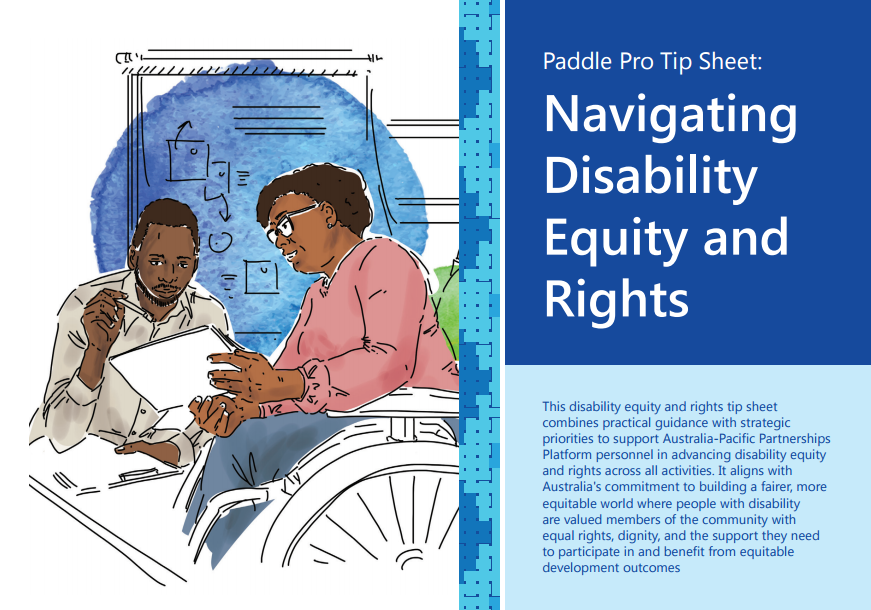Globally, 1.3 billion people, 16% of the population, live with disability. In the Asia–Pacific region alone, that number reaches 750 million.
As climate change, conflict, and ageing populations rise, so too does the prevalence of disability. Empowering people with disability could boost global GDP by over 7%, a powerful reminder of the value of inclusion. Yet, despite progress, people with disability remain among the most marginalised and poorest groups worldwide.
Learning in Action
At the Australia-Pacific Partnerships Platform (Partnerships Platform), we are continually working to strengthen disability equity across all areas of our work. This includes applying systemic thinking, adapting project design to be more inclusive, and identifying practical actions that support the diverse needs and rights of Pacific communities and governments.
In August, our team participated in a dynamic learning event led by GEDSI Specialist Shirleen Ali, who provided practical insights into disability inclusion.
Drawing on key resources such as Australia’s International Disability Equity and Rights Strategy (IDEARS), the Pacific Disability Forum’s Preconditions to Inclusion Framework and our own Navigating Disability Equity and Rights Tip Sheet, the session helped staff understand:
- Types of disabilities.
- Common barriers to inclusion.
- How to collaborate with organisations for people with disability.
- Ways to monitor and improve inclusive practices.
- How to translate strategy into meaningful action.
Key Takeaways
Shirleen highlighted IDEARS as a strategic shift from inclusion to equity and rights, guided by four core principles:
- Recognise that disability rights are human rights – People with disability have the same human rights and fundamental freedoms as those without disability. Our work at the Partnerships Platform is guided by the United Nations Convention on the Rights of Persons with Disabilities (UNCRPD) principles: human dignity, non-discrimination, participation and inclusion, respect for difference, equality of opportunity, accessibility, gender equality, and respect for the rights of children (UNCRPD, page 17).
- Follow the movement’s call for nothing without us – people with disability must lead and participate at every stage. ‘Nothing without us’ is a powerful call from the disability rights movement, urging that people with disability be heard, actively participate, and contribute at every stage of policy and program development, across all sectors. Rooted in the principle “nothing about us without us”, it goes further, recognising that the perspectives of people with disability must be integrated into all policies and programs with a human impact. We are committed to respecting this call by enabling people with disability and their representative organisations to engage with our policies and programs as leaders, decision-makers, experts, implementing partners and participants.
- People with disability are valued members of the community – viewing people with disability through a human rights perspective. People with disability live in every country, region and city across the world. Yet, they are too often excluded from the communities they call home – denied access to services, facilities and opportunities, and segregated through institutions. This exclusion stems from stigma, lack of awareness, assumptions about capability, and the persistent belief that institutional care is the only option. We will prioritise community-level approaches that create meaningful change. By working with local groups and organisations, we aim to shift attitudes, tackle challenges, and remove barriers, ensuring people with disability can live, participate, and be fully included in their communities.
- Support inclusion, equity and diversity for all people across our work. People with disability have distinct needs, priorities and perspectives shaped by their individual identities, including gender, age, culture, beliefs and sexuality. As we implement this Strategy, we will continue to recognise and respond to this diversity through our international engagement. We are committed to addressing multiple and intersecting forms of discrimination to ensure no one is left behind.
The Partnerships Platform is currently in the process of recruiting its Disability Equity and Rights Adviser – a vital step, as leadership in this space should be driven by people with lived experience of disability.
Shirleen also spoke about PDF’s Preconditions to Inclusion Framework which outlines six essential areas: accessibility, assistive technology, community-based inclusive development, non-discrimination, social protection and support services.
These concepts prompted staff to reflect on how to better integrate inclusion into daily work, by identifying policy and programming gaps, designing inclusive services, and collaborating with stakeholders to address disability, social, and gender inclusion.
The learning event explored the Tip Sheet’s practical guidance for advancing disability equity through inclusive design, barrier removal and meaningful participation. Building on this, the session also emphasised respectful language, informed consent, and the need to address key barriers, such as bias, inaccessible environments, systemic issues, and communication gaps, while highlighting enablers like civil society advocacy, strong partnerships, local leadership, and inclusive decision-making.
“In implementation, often this is where the opportunities are and where we need to do a lot of the work and invest. So, disability responsive budgeting and safeguarding is something we need to be thinking about and our role in identifying and removing these barriers”, Shirleen said.
Spotlight on Accessible Design
A highlight of the session was a discussion led by James Guy, Engineering Technical Adviser with Tuvalu’s Public Works Department. He shared insights from a recent study on accessible public housing design in Tuvalu, which explored challenges such as limited land space, material availability, and layout constraints, highlighting the importance of integrating accessibility into infrastructure planning from the outset.
This learning event was a valuable opportunity for staff to deepen their understanding of disability inclusion and reflect on how to better integrate the voices of people with disabilit into our work. It’s part of our ongoing commitment to ensure that inclusion is not just a principle, but a practice.
The Partnerships Platform hosts quarterly learning events to foster knowledge-sharing, best practice exchange, and continuous improvement in how we support our Pacific partners.
